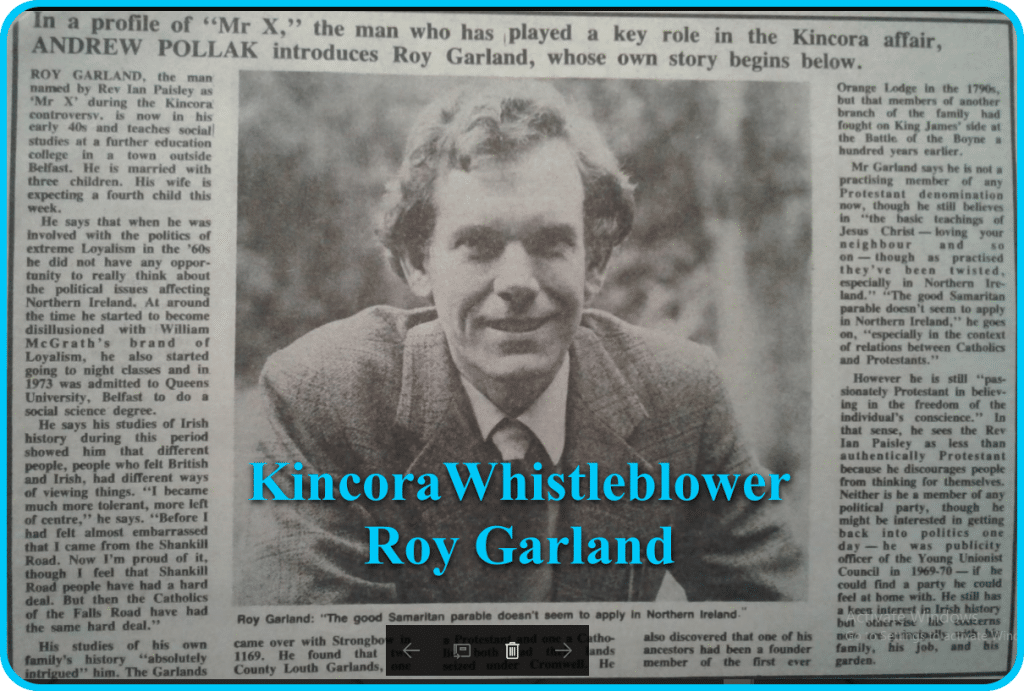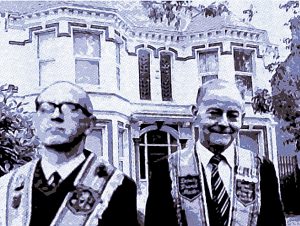Sir Jeffery Donaldson described James Molyneaux MP (later Lord Molyneaux of Killead), as one of ‘greatest’ politicians with whom he ever worked. Molyneaux led the dominant Ulster Unionist Party (UUP), between 1979 and 1995. The praise appeared on Donaldson’s official website.

Donaldson served as Molyneaux’s Personal Assistant in the 1980s.
The other figure Donaldson admired was Enoch Powel. See Sir Jeffrey Donaldson’s mentor was a sadistic child abuser. By David Burke.
Donaldson said of the pair:
‘My involvement with the Ulster Unionist Party grew as I worked alongside two of the greatest names in Unionism in the 20th century [i.e. Powell and Molyneaux].
Molyneaux, however, had a secret side which he concealed from Unionist supporters for decades. He was attracted to young men and was a friend of William McGrath, the infamous ‘Beast’ of Kincora. McGrath was convicted for some of his crimes in December 1981.

1. A faction within the British Army tried to expose a child abuse network.

During the summer of 1973, Captain Colin Wallace, a PSYOPS [psychological operations] officer with the British Army, tried to expose the existence of a child abuse network in Northern Ireland. Capt. Wallace was based at HQNI, Lisburn. He had the support of a number of colleagues in the British Army, including General Peter Leng.

Capt. Wallace briefed a number of journalists about William McGrath, an Orangeman, close ally of Ian Paisley since the 1950s, terrorist, arms smuggler and child rapist. McGrath ran a paramilitary group called TARA. McGrath once told one of his victims, James Miller, that he liked having sex with boys aged 10 or younger.
Molyneaux was a friend of William McGrath. Molyneaux was also sexually interested in young men. He was well known not only to McGrath but to other members of Tara. When one young member left the organisation, Molyneaux made inquiries to find out why he had departed from it.

Capt. Wallace was instructed ‘to brief the press’ on an unattributable basis about McGrath’s sexual preferences, his use of blackmail to force young people into homosexual practices, and the fact that he ran ‘a home for children on the Upper Newtownards Road [i.e. Kincora Boys’ Home]‘.
Capt. Wallace was given a briefing paper to assist in the PSYOP against McGrath. Molyneaux is named in it as an associate of McGrath.

Capt. Wallace has explained that by 1973:
‘The PSYOPS unit had acquired a significant amount of additional information about TARA. [They were] ‘aware that a number of prominent Tara members were closely linked with the Rev Ian Paisley.’
These included James Heyburn, Secretary of Paisley’s church; Hubert Nesbitt, who provided the land on which Paisley’s church was built; and David Brown, Deputy Editor of ‘Paisley’s Protestant Telegraph. According to Wallace:
‘We also had information alleging that serving members of the RUC not only attended TARA meetings, but also were involved in the running of the organisation. There were indications that McGrath was obtaining Intelligence information from the RUC on Republicans and there were even claims that RUC stations in East Belfast had supplied Tara with firearms which had been surrendered to the police by members of the public. I do not know how reliable the latter information was, but it was sufficient to make the Army very wary of the RUC when dealing with TARA-related information.’
2. The 1973 TARA press briefing designed to expose McGrath and destroy TARA.

In 1973, a document was prepared by the British Army to neutralise the threat posed by TARA and expose McGrath’s distasteful exploitation of children. One of those involved in the PSYOP was Hugh Mooney, a Trinity College Dublin graduate and ex-Irish Times sub-editor, who worked for the Information Research Department (IRD), the UK’s black propaganda department which was based at Riverbank House in London.
Hugh Mooney’s handwriting appears on the 1973 document which was shown to journalists by Wallace. According to Hugh Mooney, the document was written by Mike Cunningham. It was furnished to Wallace at the British Army’s HQ at Lisburn.

At this time Wallace and the British Army were not aware that MI5 and MI6 were running a vile blackmail operation involving the rape of children at Kincora. This would generate a lot of trouble for Wallace later on when Ian Cameron of MI5 would derail his career. Cameron did this because Wallace was persisting in his attempts to end the child rape at Kincora. A detailed, 60,000 word account of Wallace’s vilification at the hands of MI5 can be read in the four part ebook which starts here: Operation Clockwork Orange Vol 1 of Covert History Ireland’s new ebook.
Mooney left HQ NI at the end of 1973, so the Tara document must have been created before then.
3. James Molyneaux was named in the 1973 press briefing about McGrath and TARA.
James Molyneaux was named in the final paragraph of the 1973 TARA document as one of a number of ‘people associated with McGRATH’ who were ‘aware of his activities’.


4. Peter Broderick of the MoD tells the truth about the British Army’s knowledge that abuse was taking place at Kincora. He supports Colin Wallace after the latter’s dismissal and is pushed out of his job by the MoD.
MI5, MI6, the Northern Ireland Office (NIO) and the RUC special branch, intervened to protect McGrath because he was working for them. This network was trafficking boys to politicians and Loyalist terrorists so they could be blackmailed by MI5 and MI6.

But everyone working in intelligence in NI swam in the same river of filth as MI5, MI6, the NIO and the RUC. Peter Broderick, who was Wallace’s boss at British Army HQ NI in 1973 and 1974, was one such person. It was he who instructed Wallace to disclose the information in the 1973 Tara Press Briefing (’73 TPB) to journalists. Moreover, years later, he had the integrity to state on public record that he had initialled the document. He made this admission to two journalists, Paul Foot of The Daily Mirror and Private Eye, and Barry Penrose of The Sunday Times.
Wallace retained a copy of ‘73 TPB. It described how the ‘OC’ or Officer-in-Command of Tara was ‘William MCGRATH. He is a known homosexual who has conned many people into membership [of Tara] by threatening them with revealing homosexual activities which he himself initiated. He is a prominent figure in Unionist Party politics and in the Orange Order’.

Also that McGrath ‘uses a non-existent evangelical mission as a front for his homosexual activities and also runs a home for children on the 236 Upper Newtonards Road, Belfast (Tel: B’fast 657838)’.
Suffice it to say, this was address and telephone number of Kincora.
When Peter Broderick was given ‘73 TPB, he scrawled the words ‘Clerks IP’ across the top of it. ‘IP’ stands for Information Policy, the unit Wallace worked for. In 1990 Broderick spoke frankly to the renowned journalist Paul Foot about the ’73 TPB document. On 8 February of that year, Foot reported in the Daily Mirror that, ‘This week, for the first time, Peter Broderick, Wallace’s boss at the time – 1974 – confirmed to me that he saw the document (The TARA press brief used by Wallace to highlight McGrath’s homosexuality and his role in running a children’s home) and wrote on it. “That is certainly my writing”, he told me. “I saw the document and approved it“.’
Peter Broderick also confirmed this to Barry Penrose of The Sunday Times on 11 February 1990.

‘73 TPB also bears the handwriting of Lt Colonel Adrian Peck, who was head of PSYOPS at HQNI in 1973 and early 1974, i.e. GSO1 Information Policy.
Ian Cameron of MI5 and his colleagues engaged in a series of dirty tricks which resulted in the dismissal of Wallace from his role with the British Army. Broderick – a hero of this story – was also pushed out of the Ministry of Defence for telling the truth and supporting Wallace at the hearing that led to Wallace’s dismissal.
5. Other journalists support Colin Wallace about the existence of an Information Policy Unit (IPU) PSYOP to destroy TARA which took place in 1973.

A number of other journalists have confirmed that they either saw ‘73 TPB or received a briefing from Wallace in 1973 about Tara based on the information that was contained in it.

Kevin Dowling of The Sunday Mirror was one of them. He gave the Hart Inquiry ‘a copy of a telex he had sent to his editor in 1973’ as a result of information furnished to him by Wallace. The telex stated that ‘according to Mr. Wallace the CO [i.e. Commanding Officer] of Tara was William McGrath and a homosexual’ and that ‘McGrath apparently uses a non-existent evangelical mission as a front to entice young Protestant men into homosexuality. Once in they are potential blackmail victims and soldiers of Tara.’

So, we have a string of journalists, Colin Wallace and Peter Broderick all confirming the authenticity of ‘73 TPB which bears the handwriting of no less a figure than Lt Col. Peck and also Hugh Mooney.
There is more. On 13 March 1977, The Sunday Times published an article entitled: ‘The Army’s Secret War in Northern Ireland’ by David Blundy. It reported that at a British Army briefing in 1974
‘at which a Sunday Times reporter was present attempts were made to link Paisley with the Protestant para-military group called Tara, a small, obscure and ineffective group as Ulster’s para-military organisations go. The Sunday Times has a copy of an Army intelligence summary on Tara which contains accurate details about its organisation. .. One member, which the summary names, is called a “homosexual and has conned many people into membership by threatening them with revealing homosexual activities which he had initiated“.’
The Sunday Times believed the purpose of the briefing was ‘to link Paisley with homosexuals and Communist sympathisers. .. Our sources say that the army has produced three anonymous documents on this theme which circulated in Belfast.’
6. Hugh Mooney’s handwritten note about Roy Garland provides additional confirmation of the Army’s knowledge of McGrath’s activities.
A man called Roy Garland had been involved in TARA but had walked out in 1971. He then spent years trying to expose McGrath and Kincora and became another of the heroes of this appalling saga.
A handwritten note appears on the 1973 Tara Press Briefing which refers to Garland and records that ‘he said he resigned’ from TARA. These words were added in by Hugh Mooney. And Garland had indeed left TARA.
Roy Garland has confirmed to Covert History Ireland and UK that McGrath knew Molyneaux.

7. Even Sir Anthony Hart had to acknowledge that the 1973 press briefing was genuine.
Judge Anthony Hart, who described himself as ‘lazy’, led an inquiry into Kincora and produced an error strewn report about the child abuse scandal in 2017. In that report Hart doubled over in contortions to undermine Colin Wallace, yet he was not able to deny that Wallace had warned the media about McGrath’s abuse of ‘young‘ men. In other words: the document that refers to James Molyneaux’s knowledge of McGrath activities is recognised by the British Establishment as genuine.

The reason Hart had to make this concession – despite his obstinate bias and determination not to find anything that might upset MI5 and the NIO – was because the evidence of its existence was overwhelming.
Despite this proof – which Hart accepted as genuine – he made no effort to probe Molyneaux’s links to McGrath and TARA.

The now defunct Independent Inquiry into Child Sexual Abuse in London also ignored a mountain of evidence about VIP child abuse with links to Ireland although this was the very reason it was established in the first place.
8. The former British Prime Minister’s Private Secretary, a Unionist MP, was also mentioned in the 1973 TARA press briefing.

James Molyneaux inherited his Westminster seat from Sir Samuel Knox Cunningham MP, QC. Molyneaux was Cunningham’s constituency agent before the latter retired from Westminster in 1970. Sir Jeffrey Donaldson now holds the seat.
Cunningham is also mentioned in the 1973 document.
Cunningham was once known as the ‘Boxing Queen’ because of his homosexuality and prowess as a pugilist. He became a heavyweight boxing champion at Cambridge. In later life he was elected as a Unionist MP. In the 1960s he represented South Antrim. He served as Parliamentary Private Secretary to Prime Minister Harold MacMillan, 1959-1963, and as such routinely attended Cabinet meetings at 10 Downing Street.
Knox Cunningham often stayed with the MI5 traitor and paedophile Anthony Blunt while in London and also knew Guy Burgess from their days at Cambridge. He was a rich man and lived on a 70-acre estate at Glencairn Park, and once came within an inch of becoming Grandmaster of the Orange Order.
The whistleblower Robin Bryans also knew Cunningham well. Cunningham was a key participant in the Anglo-Irish Vice Ring. Bryans recalled that Cunningham:
‘Always liked to appear as the great Queen’s Counsel who knew more than anybody about everybody, especially those in my books and bed.’

Knox Cunningham knew Bryans so well he was able to influence him to alter the content of his book ‘Ulster’. When Cunningham discovered that it was due to contain a passage about internment during the IRA’s Border Campaign of the 1950s, he feared it would create a bad impression abroad and intervened: ‘Sir Knox Cunningham asked me to delete my reference to internment without trials and I agreed believing him to share in 1963’s atmosphere of reconciliation over sectarian hatred.’
Cunningham became involved in the World Alliance of Young Men’s Christian Association (YMCA) in 1947 and became Chairman of its National Council two years later, something which put him in charge of the YMCA in Ireland, Wales and England. His Wikipedia entry suggests that he became involved with the YMCA because of his ‘religious faith’ but it is more likely he wanted to gain access to young men. Much of his interaction with the YMCA boys involved the sport of boxing. According to Bryans, he took Kincora boys to the YMCA in England.

Macmillan recalled Knox Cunningham fondly in his memoirs and awarded him a baronetcy in his resignation honours. Despite this, his publishing company, Macmillan, failed to publish Cunningham’s memoirs.
9. County Grand Master of the Orange Order, Thomas Passmore also features in the 1973 document.

Another Orangeman and associate of Molyneaux was mentioned in the 1973 document, Thomas Passmore. He was another paedophile.

10. Ian Paisley features on the list too.

Another name to feature on the list is Ian Paisley, the founder of the DUP.
The final name in the list on the last paragraph of the document is the Rev. Martin Smyth MP for Belfast South, 1982-2005.

Smyth and Donaldson, both MPs, resigned the UUP whip together in 2003. Smyth tried to persuade Donaldson to stay within the UUP but he left for the DUP at the invitation of Peter Robinson.


David Burke is the author of three books published by Mercier Press: –

‘Deception & Lies, the Hidden History of the Arms Crisis 1970’, and;
‘Kitson’s Irish War, Mastermind of the Dirty War in Ireland’ which examines the role of counter-insurgency dirty tricks in Northern Ireland in the early 1970s, and;
‘An Enemy of the Crown, the British Secret Service Campaign against Charles Haughey’, which was published on 30 September 2022.
These books can be purchased here:
https://www.mercierpress.ie/irish-books/kitson-s-irish-war
https://www.mercierpress.ie/irish-books/an-enemy-of-the-crown
https://www.mercierpress.ie/irish-books/deception-and-lies
David Burke’s next book, ‘The Puppet Masters’, will be published in June 2024.
See also: The Mountbatten dossier, an ebook by David Burke.

See also Kincora’s Darkest Secret.

See also: Prince Philip’s illicit sex life was monitored by Soviet spies.

See also Operation Clockwork Orange Vol 1 of Covert History Ireland’s new ebook.


